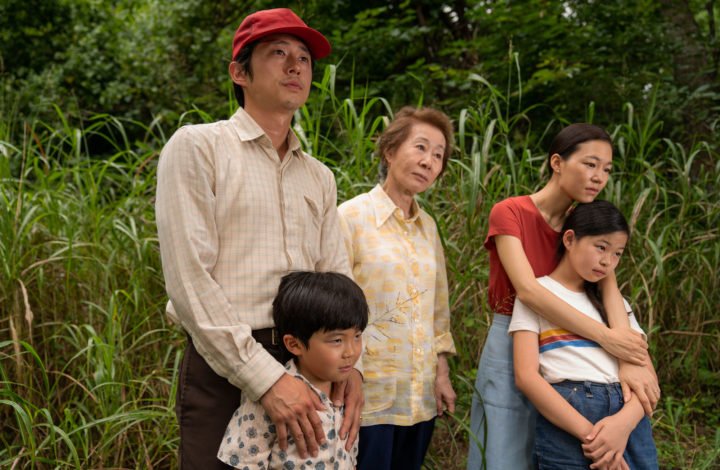
MPAA Rating: PG-13 | Rating: ★★★★
Release year: 2020
Genre: Coming-of-Age, Drama, Family, Spiritual Director: Lee Isaac Chung
Lee Isaac Chung’s Minari is a beautifully earnest film marked by a tenderness to its depiction of an immigrant family navigating the difficulties of pursuing the American Dream. Inspired by Chung’s own upbringing, Minari is set in 1980s Arkansas, where the ambitious Jacob (Steven Yeun) has brought his Korean-American family—his wife, Monica (Yeri Han), and two American-born children, Anne (Noel Cho) and David (Alan Kim)—from California in search of financial independence and freedom. The film begins with the family’s arrival on the 50-acre patch of dirt Jacob has purchased, and everything we need to know about this family dynamic is thus introduced in this event: Jacob is pleased with himself, while Monica remains skeptical; the serious-minded Anne is mostly quiet, while the more rambunctious David sees this all as an adventure. When Jacob’s farming plans prove difficult and Monica begins to feel loneliness and regret, they bring Monica’s spunky mother, Soonja (Yuh-jung Youn) from Korea to live with them in their tiny abode. Soonja is a spitfire, and Youn gives one of the best supporting performances from 2020. Likewise, Steven Yeun is rightly receiving praise for his understated and complex performance as Jacob, a man who quietly carries the weight of responsibility for his family on his shoulders as he pursues his own dream of a secure future.
Minari features the obvious culture clashes one would expect from such an immigrant tale, yet infuses them with a vivid sense of the extraordinary within the ordinary. Objects, environments, and decisions which may feel mundane to those who have never experienced life as a minority before are here revealed as both wondrous and challenging. As Jacob and Monica speak mainly Korean, they often have to navigate getting to know neighbors and co-workers through their English-speaking children. Indeed, Minari often gives preference to the children’s perspective in the story-telling, and we primarily see this new landscape through David’s eyes. Through the warm atmospheric cinematography and lovely piano-led score, as well as the rich performances from both the main and supporting cast, Minari is simply lovely in every way.
While I loved the performances, the cinematography, and the score, Minari maintains a plot structure which leaves little suspense as to its outcome. I must confess that I accurately predicted the conclusion about 20 minutes before the film ended—right down to the final shot—which ultimately left me a bit disappointed. I enjoy it when a film’s narrative surprises-yet-satisfies me, like the journey was always meant to conclude Just So even if the path to get there was full of the unexpected and wonderful. This is not to say that Minari is unsatisfying or dull (far from it), but rather that its simple and straightforward story is one which may not be unfamiliar to many viewers. In fact, the very familiarity of the immigrant experiences may be precisely why the film is so heartwarming and well-received—those who have lived the minority or immigrant experience can quickly recognize themselves in these characters.
The depiction of religion in Minari is also noteworthy, in that it’s paradoxically obvious while also subtle and subdued. For instance, Will Patton plays Paul, a local farmhand Jacob hires to help tend his land. The pair couldn’t be any more different. Paul practices a wide-eyed passionate Pentecostal Christianity where he prays to Jesus aloud and sees demons in every social ill. He literally carries a wooden cross through the midwestern fields on Sundays, a peculiar sight which inspires both curiosity and ridicule from onlookers. Jacob isn’t much of a believer, but he endures Paul’s boisterous faith with quiet respect. As another example, Jacob and Monica—both names laden with significant religious allusions—decide to attend a local evangelical church in order to make friends (the scene is all-too-familiar in their cringe-worthiness). The language of salvation is prominent too: in a key conversation, Jacob asks Monica, “remember what we said when we got married? That we’d move to America and save each other?” She nods in the affirmative. They’re a family who has chosen to live by faith—in Christianity, yes, but this is also faith in the American Dream, one which may or may not reveal itself as pursuit of a false idol. Still, the film neither downplays nor demonizes faith (in God, in money, in family, in culture, in one’s own intellectual faculties and hard work) but rather simply shows it, and shows it simply. It’s this very simplicity which is perhaps Minari‘s greatest strength—by showing us the particular rituals and rhythms of this singular family in this specific time and place in America, Minari elevates a down-to-earth narrative to the level of mythology.
IMDB Listing: https://www.imdb.com/title/tt10633456/
Leave a Reply